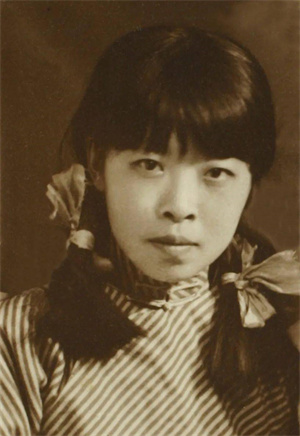
当铺
◎ 萧红
“你去当吧!你去当吧,我不去!”
“好,我去,我就愿意进当铺 〔14〕 ,进当铺我一点也不怕,理直气壮。”
新做起来的我的棉袍,一次还没有穿,就跟着我进当铺去了!在当铺门口稍微徘徊了一下,想起出门时郎华要的价目 〔15〕 ——非两元不当。
包袱送到柜台上,我是仰着脸,伸着腰,用脚尖站起来送上去的,真不晓得当铺为什么摆起这么高的柜台 〔16〕 !
那戴帽头的人翻着衣裳看,还不等他问,我就说了:
“两块钱。”
他一定觉得我太不合理,不然怎么连看我一眼也没看,就把东西卷起来,他把包袱仿佛要丢在我的头上,他十分不耐烦的样子 〔17〕 。
“两块钱不行,那么,多少钱呢?”
“多少钱不要。”他摇摇像长西瓜形的脑袋,小帽头顶尖的红帽球,也跟着摇了摇。
我伸手去接包袱,我一点也不怕,我理直气壮,我明明知道他故意作难 〔18〕 ,正想把包袱接过来就走。猜得对对的,他并不把包袱真给我 〔19〕 。
“五毛钱!这件衣服袖子太瘦,卖不出钱来……”
“不当。”我说。
“那么一块钱,……再可不能多了,就是这个数目。”他把腰微微向后弯一点,柜台太高,看不出他突出的肚囊……一只大手指,就比在和他太阳穴一般高低的地方。
带着一元票子和一张当票,我怏怏地走,走起路来感到很爽快,默认自己是很有钱的人。菜市,米店我都去过,臂上抱了很多东西,感到非常愿意抱这些东西,手冻得很痛,觉得这是应该,对于手一点也不感到可惜,本来手就应该给我服务,好像冻掉了也不可惜。走在一家包子铺门前,又买了十个包子,看一看自己带着这些东西,很骄傲,心血时时激动,至于手冻得怎样痛,一点也不可惜。路旁遇见一个老叫化子,又停下来给他一个大铜板,我想我有饭吃,他也是应该吃啊!然而没有多给,只给一个大铜板,那些我自己还要用呢! 〔20〕 又摸一摸当票也没有丢,这才重新走,手痛得什么心思也没有了,快到家吧!快到家吧。但是,背上流了汗,腿觉得很软,眼睛有些刺痛 〔21〕 ,走到大门口,才想起来从搬家还没有出过一次街,走路腿也无力,太阳光也怕起来。
又摸一摸当票才走进院去。郎华仍躺在床上,和我出来的时候一样,他还不习惯于进当铺。他是在想什么。拿包子给他看,他跳起来了:
“我都饿啦,等你也不回来。”
十个包子吃去一大半,他才细问:“当多少钱?当铺没欺负你?”
把当票给他,他瞧着那样少的数目:
“才一元,太少。”
虽然说当得的钱少,可是又愿意吃包子,那么结果很满足 〔22〕 。他在吃包子的嘴 〔23〕 ,看起来比包子还大,一个跟着一个,包子消失尽了。
The Pawnshop
◎ Xiao Hong
“You go and do the pawning! You go, but not me!”
“OK, I go. I wouldn’t mind. I’m not afraid at all. I don’t see anything wrong about it.”
Thus, my newly-made cotton-padded gown, which had not been worn even once, accompanied me to the pawnshop. At the door of the pawnshop I hesitated for a while, recalling the asking price suggested by Lang Hua when I left home — “Nothing less than two yuan.”
I stood on tiptoe, face upward and back straightened, to hand the cloth-wrapped bundle onto the counter. How strange the pawnbroker should have put up a counter so forbiddingly high!
A man in a skullcap turned the gown over and over to examine it. Before he could open his mouth, I said,
“Two yuan.”
He must have thought me too unreasonable, for he rolled up the gown without even taking a look at me. Impatience was written all over his face as if he were about to throw the bundle onto my head.
“If two yuan won’t do, then how much?”
“We won’t take it for anything,” said he, shaking his longish watermelon-shaped head, the decorative red bead on top of his skullcap swaying.
I was aware that he was out to make things difficult for me. Therefore, bold and confident, I reached out my hand for the bundle. But, just as I had been doubly sure, he simply wouldn’t let go of it.
“Fifty cents! The sleeves are too tight. The gown won’t fetch much…”
“I won’t pawn it,” said I.
“Well, how about one yuan? … Can’t give you any more. That’s final.” He leaned back a little bit, his bulging paunch concealed behind the high counter … Meanwhile, to signal “one yuan”, he gestured with a finger raised as high as his temples.
Armed with a one-dollar note and a pawn ticket, I, unhappy as I was, walked with a light step and felt like one of the rich. I visited the food market and the grain shop. I did not tire of carrying an armful of purchases. My hands ached with cold, but this was as it should be. I felt no pity for them. It was their bounden duty to wait on me — even at the cost of suffering frostbite. I also bought ten steamed stuffed buns at a pastry shop. I was proud of my shopping. Again and again I felt so thrilled that I completely forgot all the pain in my frostbitten hands. When I saw an old beggar by the roadside, I stopped to give him a copper coin. Why, if I had food to eat, he certainly had no reason to go hungry! But I couldn’t afford to give him more, for I needed the rest of the money for keeping my own body and soul together! Before I walked on again, I put my hand on the pawn ticket in my pocket to make sure that it was still there. By then, the pain in my hands had become the only thing I was conscious of. So I was anxious to be home again. My back sweated, my legs felt like jelly, my eyes stung. At the gate of my home, it suddenly occurred to me that this was the first time I had ever been out to town since I moved here and that accounted for my legs feeling so weak and my eyes being so shy of light.
On entering the courtyard, I touched the pawn ticket again. Lang Hua was still lying on the bed with the same aversion to a pawnshop. I wondered what was now in his mind. The moment I produced the buns, he jumped up from his bed,
“I’m so hungry. I’ve been long waiting for you to come back.”
It was not until he had gulped down more than half of the buns that he began to question me closely, “How much did you pawn it for? Did they cheat you?”
I showed him the pawn ticket and he eyed the pitifully small sum scratched on it.
“Only one yuan? Too little!”
True, the money was too little, but the buns were good to eat, so that all’s well that ended well. One after another vanished the buns into his cavernous mouth — a mouth that looked even bigger than a bun.
萧红是有才华的女作家。从1932到1934年她与作家萧军在哈尔滨共同度过了一段极艰苦的日子。《当铺》一文所反映的即当时的生活情景。
注释
〔14〕 “我就愿意进当铺”译为I wouldn’t mind,所采用的是正反表达法,把原文从正面表达的句子,在译文中从反面来表达,以便提高译文的效果。
〔15〕 “要的价目”译为the asking price,为英语常用语,是从to ask a price转过来的。
〔16〕 “这么高的柜台”译为a counter so forbiddingly high,其中forbiddingly作“令人生畏”或“难以靠近”(unfriendly或unapproachable)解,原文虽无其词而有其意。
〔17〕 “十分不耐烦的样子”译为Impatience was written all over his face,其中to be written all over(或on)作“显露”解,为英语惯用表达法。
〔18〕 “他故意作难”译为he was out to make things difficult for me,其中to be out to do(或for)something作“企图”(to intend或want)解,为英语惯用表达法。
〔19〕 “他并不把包袱真给我”译为he simply wouldn’t let go of it,其中let go of是英语习用短语,作“放手”(to stop holding)解。
〔20〕 “然而没有多给……那些我自己还要用呢!”译为But I couldn’t afford to give him more, for I needed the rest of the money to keep my own body and soul together!,其中to keep my own body and soul together作“勉强维持生活”(just to make both ends meet)解,是译文中的添加成分,原文虽无其词,而有其意。
〔21〕 “背上流了汗,腿觉得很软,眼睛有些刺痛”译为My back sweated, my legs felt like jelly, my eyes stung,三句并列,都用不及物动词,并采用连词省略法(asyndeton),有助于提高译文的表达效果。
〔22〕 “那么结果很满足”译为so that all’s well that ended well,其中all’s well that ends well是英语谚语,作“有了好结果就行了”(It is the end that matters)解。
〔23〕 “嘴”译为cavernous mouth,其中cavernous是为衬托原意而添加的成分,作“大而深”(very large and deep)解。
 帕布莉卡
帕布莉卡